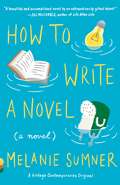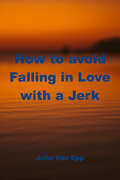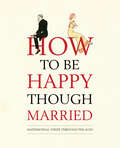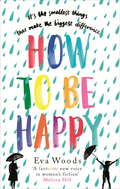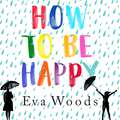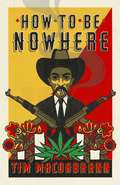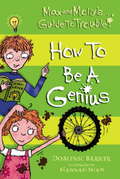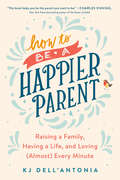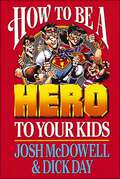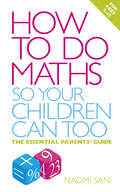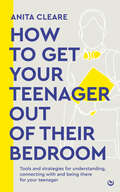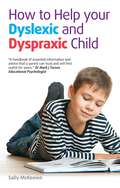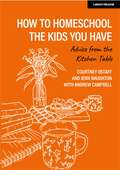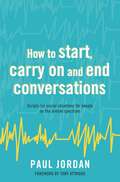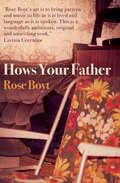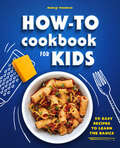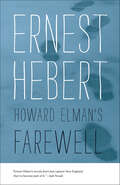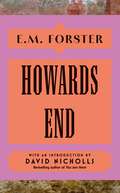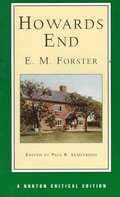- Table View
- List View
How to Write a Novel
by Melanie SumnerAristotle "Aris" Thibodeau is 12.5 years old and destined for greatness. Ever since her father's death, however, she's been stuck in the small town of Kanuga, Georgia, where she has to manage her mother Diane's floundering love life and dubious commitment to her job as an English professor. Not to mention co-parenting a little brother who hogs all the therapy money. Luckily, Aris has a plan. Following the advice laid out in Write a Novel in Thirty Days! she sets out to pen a bestseller using her charmingly dysfunctional family as material. If the Mom-character, Diane, would ditch online dating and accept that the perfect man is clearly the handyman/nanny-character, Penn MacGuffin, Aris would have the essential romance for her plot (and a father in her real life). But when a random accident uncovers a dark part of Thibodeau family history, Aris is forced to confront the fact that sometimes in life--as in great literature--things might not work out exactly as planned.From the Trade Paperback edition.ndom accident uncovers a dark part of Thibodeau family history, Aris is forced to confront the fact that sometimes in life--as in great literature--things might not work out exactly as planned.From the Trade Paperback edition.
How to avoid Falling in Love with a Jerk: The Foolproof Way to Follow Your Heart Without Losing Your Mind
by John Van EppAvoid the jerks and find “the one” who's right for you! Based on years of research on marital and premarital happiness, this book (previously published in hardcover as How to Avoid Marrying a Jerk) will help you break destructive dating patterns that have kept you from finding the love you deserve: Ask the right questions to inspire meaningful, revealing conversations with your partner; Judge character based on compatibility, relationships skills, friends, and patterns from family and previous relationships; Resolve your own emotional baggage so you're ready for a healthy relationship.
How to be Happy Though Married
by Old BooksThe bounteous pleasures of married life have been endured by stoical, ingenious men and women for millennia. 'How to be Happy Though Married' is a compendium of their hard-won wisdom, offering advice for any conceivable conjugal conundrum, from the potential of a wife to wander (you might consider stealing her shoes, a la the Ancient Greeks) to the avoidance of a drunk husband's amorous advances. Why suffer or rejoice alone when this book revealing the advice, observations and witty rejoinders of Jane Austen, Plutarch, Shakespeare, Trollope and Einstein could be your constant companion?
How to be Happy: The unmissable, uplifting Kindle bestseller
by Eva Woods'So likeable, smart and wise. A bittersweet read about love, life and friendship that makes you stop and think long after you've finished reading the last page.' - bestselling author Tasmina Perry 'Entertaining, funny and full of wisdom, I loved this book.' - bestselling author Katie Fforde 'I read this recently and loved it SO much. I cried buckets, but it's ultimately a really positive, uplifting book about making every day count.' - bestselling author Clare Mackintosh ---------------------------------- The smallest things can make the biggest difference. Annie has been sad for so long that she's forgotten how to be any other way. Until she meets Polly. Polly is everything that Annie is not. She's colourful, joyful, happy. Because if recent events have taught Polly anything, it's that your time is too short to waste a single day. Polly has one hundred days to help Annie find happiness. Annie's convinced it's impossible, but so is saying no to Polly. And on an unforgettable journey, Annie begins to realise that maybe, just maybe, there's still colour to be found in the world. But then it becomes clear that Polly's about to need her new friend more than ever...and Annie will have to decide once and for all whether letting others in is a risk worth taking. If you liked Eleanor Oliphant is Completely Fine or The Keeper of Lost Things, you'll love How to Be Happy ********************** 'A joyful, wise read' - Rosie Blake 'It's a gorgeous book - funny, touching, sweet, sad and profound.' - Daisy Buchanan 'You'll laugh and cry . . . heartwarming' - Best 'Uplifting' - Independent 'Will make you laugh while it tugs at your heart strings' - The People
How to be Happy: The unmissable, uplifting Kindle bestseller
by Eva Woods'So likeable, smart and wise. A bittersweet read about love, life and friendship that makes you stop and think long after you've finished reading the last page.' - bestselling author Tasmina Perry 'Entertaining, funny and full of wisdom, I loved this book.' - bestselling author Katie Fforde 'I read this recently and loved it SO much. I cried buckets, but it's ultimately a really positive, uplifting book about making every day count.' - bestselling author Clare Mackintosh ---------------------------------- The smallest things can make the biggest difference. Annie has been sad for so long that she's forgotten how to be any other way. Until she meets Polly. Polly is everything that Annie is not. She's colourful, joyful, happy. Because if recent events have taught Polly anything, it's that your time is too short to waste a single day. Polly has one hundred days to help Annie find happiness. Annie's convinced it's impossible, but so is saying no to Polly. And on an unforgettable journey, Annie begins to realise that maybe, just maybe, there's still colour to be found in the world. But then it becomes clear that Polly's about to need her new friend more than ever...and Annie will have to decide once and for all whether letting others in is a risk worth taking. If you liked Eleanor Oliphant is Completely Fine or The Keeper of Lost Things, you'll love How to Be Happy ********************** 'A joyful, wise read' - Rosie Blake 'It's a gorgeous book - funny, touching, sweet, sad and profound.' - Daisy Buchanan 'You'll laugh and cry . . . heartwarming' - Best 'Uplifting' - Independent 'Will make you laugh while it tugs at your heart strings' - The People
How to be Nowhere
by Tim MacGabhannLife is finally on the right track for reporter and recovering addict Andrew: he is slowly coming to terms with the murder of his photographer boyfriend Carlos, pursuing sobriety and building a new home with a new partner. Andrew has almost forgotten about the story that ruined his life - but that story hasn't forgotten about him, and a series of deadly threats forces him into helping the very man whose gang murdered his boyfriend and left him homeless.A literary take on the classic chase movie, HOW TO BE NOWHERE is the sequel to Tim MacGabhann's genre-busting and critically-acclaimed debut CALL HIM MINE, and a blistering thrill-ride deep into the fog of Central America's murky present and tragic future.
How to be Nowhere
by Tim MacGabhannLife is finally on the right track for reporter and recovering addict Andrew: he is slowly coming to terms with the murder of his photographer boyfriend Carlos, pursuing sobriety and building a new home with a new partner. Andrew has almost forgotten about the story that ruined his life - but that story hasn't forgotten about him, and a series of deadly threats forces him into helping the very man whose gang murdered his boyfriend and left him homeless.A literary take on the classic chase movie, HOW TO BE NOWHERE is the sequel to Tim MacGabhann's genre-busting and critically-acclaimed debut CALL HIM MINE, and a blistering thrill-ride deep into the fog of Central America's murky present and tragic future.
How to be a Genius (Max and Molly's Guide to Trouble #2)
by Dominic BarkerIn this Guide to Trouble, Max and Molly will show you, clever reader:1. How to mend a puncture WITH MUD2. How to cover Mr Everett's dog WITH MUD3. How to accidentally-also-at-the-same-time be a real-life GENIUS!
How to be a Happier Parent: Raising a Family, Having a Life, and Loving (Almost) Every Minute
by Kj Dell'AntoniaAn encouraging guide to helping parents find more happiness in their day-to-day family life, from the former lead editor of the New York Times Motherlode blog.In all the writing and reporting KJ Dell'Antonia has done on families over the years, one topic keeps coming up again and again: parents crave a greater sense of happiness in their daily lives. In this optimistic, solution-packed book, KJ asks: How can we change our family life so that it is full of the joy we'd always hoped for? Drawing from the latest research and interviews with families, KJ discovers that it's possible to do more by doing less, and make our family life a refuge and pleasure, rather than another stress point in a hectic day. She focuses on nine common problem spots that cause parents the most grief, explores why they are hard, and offers small, doable, sometimes surprising steps you can take to make them better. Whether it's getting everyone out the door on time in the morning or making sure chores and homework get done without another battle, How to Be a Happier Parent shows that having a family isn't just about raising great kids and churning them out at destination: success. It's about experiencing joy--real joy, the kind you look back on, look forward to, and live for--along the way.
How to be a Hero to Your Kids
by Josh McdowellHow can you be a hero to your kids? And why is it so important today? This video gives answers, and offers a game plan based on the principles taught by Jesus. They call the plan the Six A's for Positive Parenting. This landmark video offers one of the best parenting courses available today. Includes hardcover book of the same name, leader's guide and reproducible discussion guide. Four 50-minute sessions (25 minutes of video and 25 minutes of group interaction)
How to do Maths so Your Children Can Too: The essential parents' guide
by Naomi SaniDoes the sight of your child's maths homework fill you with dread? Do you look for any excuse when they ask you to explain equations, fractions or multiplication? Maths can often leave children - and parents - perplexed.How to do Maths so Your Children Can Too works through maths topics with a simple step-by-step approach, explaining the new ways of teaching maths that confuse so many parents. This book will show you how to:- Master 'number bonds' and 'number lines'- Divide by 'chunking'- Multiply using 'the grid method'- Work with fractions, percentages and ratios- Understand number and place valueBridging the gap between primary and secondary school - when children often struggle - and packed full of simple, accessible examples, this essential guide will banish your maths phobia and take the pain out of homework time.
How to get your teenager out of their bedroom: The ultimate tools and strategies for understanding, connecting with and being there for your teenager
by Anita CleareBe the parent your teenager needsTeens retreat to their rooms for lots of reasons: gaming, social media, low self-esteem or just establishing independence. The problem is, if your teen won&’t talk to you, it&’s very hard to know what&’s going on, when to worry and how best to help.This book offers concrete tips on how you can maintain a good relationship and support your teen&’s wellbeing despite that often-closed bedroom door, including: real-world wins and everyday actions to build connectionthe blueprint for how to get a reluctant teen to spend time with you (and why it really matters that you persevere)tips on how to communicate effectively (without nagging!)strategies for tackling tricky issues like compulsive gaming, obsessive phone use and social anxietyan honest look at the difficult emotions that we experience when our child starts pushing us awayThe presence of a caring, supportive adult is the most important factor in helping teens grow into happy young adults. This book will help both you and your teen rise to the challenges of these tricky transitional years and come out on the other side stronger.
How to help your Dyslexic and Dyspraxic Child: A practical guide for parents
by Sally McKeownHow can I help my child that has got dyslexia or dyspraxia? Perhaps you've just found out your child has dyslexia, or suspect your child may have dyspraxia. This can be a confusing time for any parent, full of worry and uncertainty. Author Sally McKeown gets right to the heart of the matter in How to Help your Child with Dyslexia and Dyspraxia. She brings you expert knowledge of exactly what dyslexia and dyspraxia are and how they can affect your child's life. Through the experiences of other parents, Sally dispels common myths and helps you to better understand and support your child. From getting a diagnosis to making sure you get enough support from your school this guide is packed with advice to make your life easier. It's packed with practical ways to help your child, including: how to build your child's confidence if it has been knocked how you can help with homework, without doing it games, activities and hobbies to improve co-ordination and motor skills different ways of learning that your child will respond to Written in a friendly style with other parents' experiences littered throughout, you will find it easy to put this advice into action and help your child.
How to help your Dyslexic and Dyspraxic Child: A practical guide for parents
by Sally McKeownHow can I help my child that has got dyslexia or dyspraxia? Perhaps you've just found out your child has dyslexia, or suspect your child may have dyspraxia. This can be a confusing time for any parent, full of worry and uncertainty. Author Sally McKeown gets right to the heart of the matter in How to Help your Child with Dyslexia and Dyspraxia. She brings you expert knowledge of exactly what dyslexia and dyspraxia are and how they can affect your child's life. Through the experiences of other parents, Sally dispels common myths and helps you to better understand and support your child. From getting a diagnosis to making sure you get enough support from your school this guide is packed with advice to make your life easier. It's packed with practical ways to help your child, including: how to build your child's confidence if it has been knocked how you can help with homework, without doing it games, activities and hobbies to improve co-ordination and motor skills different ways of learning that your child will respond to Written in a friendly style with other parents' experiences littered throughout, you will find it easy to put this advice into action and help your child.
How to homeschool the kids you have: Advice from the kitchen table
by Andrew Campbell Courtney Ostaff Jenn NaughtonIn How to Homeschool the Kids You Have, three veteran home educators lead you through the process of creating a custom educational plan that works for your family's unique situation and your children's needs. You'll identify your own educational priorities and learn how to translate them into a strong academic program. You'll also learn about what science tells us about how humans- especially young humans-learn, and why that information is crucial for the success of your homeschooling plans. Along the way, the authors share their own experiences and those of other homeschoolers to help you avoid pitfalls so you can provide your children with the excellent education that is their birthright.
How to homeschool the kids you have: Advice from the kitchen table
by Drew Campbell Courtney Ostaff Jenn NaughtonIn How to Homeschool the Kids You Have, three veteran home educators lead you through the process of creating a custom educational plan that works for your family's unique situation and your children's needs. You'll identify your own educational priorities and learn how to translate them into a strong academic program. You'll also learn about what science tells us about how humans- especially young humans-learn, and why that information is crucial for the success of your homeschooling plans. Along the way, the authors share their own experiences and those of other homeschoolers to help you avoid pitfalls so you can provide your children with the excellent education that is their birthright.
How to start, carry on and end conversations: Scripts for social situations for people on the autism spectrum
by Tony Attwood Paul JordanDo you find it hard to make friends? Do you struggle to know what to say to start a conversation? In this book, Paul Jordan, who is on the autism spectrum, explains how to make sense of everyday social situations you might encounter at school, university or in other group settings. He reveals how, with the use of just 65 simple words, it is possible to create 'scripts for thinking' that break conversations down into small chunks and help you to think of what to say, whether you are speaking to a fellow student, starting a conversation with a new friend, calling out bullies or answering a teacher's question. These small words will be a big help for all teenagers and young people with ASD.
How's Your Father
by Rose BoytSometimes there is just not enough love to go round... With compassion and dark humour, this gripping novel celebrates life and death in the London borough of Hackney - and everything in between
How's Your Father
by Rose BoytSometimes there is just not enough love to go round... With compassion and dark humour, this gripping novel celebrates life and death in the London borough of Hackney - and everything in between
How-To Cookbook for Kids: 50 Easy Recipes to Learn the Basics
by Nancy PolancoHelp kids ages 8 to 12 learn to cook their favorite dishes—and discover new ones! Involving kids in the kitchen can help them better appreciate food, broaden their tastes, and, most importantly, have fun! This introductory kids' cookbook features simple directions and a full range of tasty recipes perfect for new cooks. They'll be ready to whip up their own breakfasts, lunches, dinners, and snacks in no time—all while building the essential kitchen skills they'll need as they grow. This cookbook for boys and girls features: Kid-approved recipes—This book gets them started on the joy of food with healthier takes on kid-friendly classics, like burgers, pizza, tacos, mac and cheese, waffles, and more. Child-friendly guidance—Directions are straightforward and detail every part of the process, ensuring kids know what they need to do at each step. Core cooking skills—Kids will learn how to stay safe in the kitchen, read recipes, measure and mix ingredients, use a knife, and more. Help kids serve up their own healthy and flavorful meals with The How-To Cookbook for Kids.
Howard Elman's Farewell: The Darby Chronicles #7 (The Darby Chronicles)
by Ernest HebertPart Falstaff, part King Lear, but all American, Howard Elman was a fifty-something workingman when he burst onto the literary scene in The Dogs of March, the first novel of the Darby Chronicles. Now in this, its seventh installment, the Darby constable is an eighty-something widower who wants to do "a great thing" before he motors off into the sunset.Maybe Howard achieves this goal, but he manages it in strange, wonderful, and dangerous ways. On his quest he's aided, abetted, hindered, and befuddled by his middle-aged children, his hundred-year-old hermit friend Cooty Patterson, a voice in his head, and the person he loves most, his grandson, Birch Latour. At 24, Birch has returned to Darby with his friends to take over the stewardship of the Salmon Trust and to launch a video game, Darby Doomsday. At stake is the fate of Darby. And the world? Maybe.Howard Elman's Farewell begins as a coming of (old) age story, morphs into a murder mystery, expands into a family saga, and in the end might just follow Howard Elman into the spirit world.This is a novel for people who like New England fiction with humor, pathos, and just a touch of magical realism. Howard Elman's Farewell establishes Howard Elman—mill worker, trash man, town cop—as the most fully developed working class character in American fiction.
Howards End
by E M Forster'A social comedy, often delightful . . . with energy, curiosity and wit'DAVID NICHOLLS'Forster's masterpiece'THE TIMES'The present flowed by them like a stream. The tree rustled. It had made music before they were born, and would continue after their deaths, but its song was of the moment.'Howards End, the country home of the Wilcoxes, overlooks a fertile garden and a meadow beyond, the boundary marked by a majestic wych-elm tree. Great red poppies bloom, cherry and plum trees flower and the scent of cut hay perfumes the air.In the spring of 1905, within those vine-covered walls, a brief romance between Helen Schlegel and Paul Wilcox brings the pragmatic, bourgeois Wilcoxes into conflict with the liberal, idealistic Schlegels. When Helen befriends Leonard Bast, a young bank clerk on the edge of ruin, a chain of events is set in motion that brings the Schlegel, Wilcox and Bast families together irrevocably, for better or for worse, and leads back, in the end, to where it all began, Howards End.
Howards End
by E M Forster'A social comedy, often delightful . . . with energy, curiosity and wit'DAVID NICHOLLS'Forster's masterpiece'THE TIMES'The present flowed by them like a stream. The tree rustled. It had made music before they were born, and would continue after their deaths, but its song was of the moment.'Howards End, the country home of the Wilcoxes, overlooks a fertile garden and a meadow beyond, the boundary marked by a majestic wych-elm tree. Great red poppies bloom, cherry and plum trees flower and the scent of cut hay perfumes the air.In the spring of 1905, within those vine-covered walls, a brief romance between Helen Schlegel and Paul Wilcox brings the pragmatic, bourgeois Wilcoxes into conflict with the liberal, idealistic Schlegels. When Helen befriends Leonard Bast, a young bank clerk on the edge of ruin, a chain of events is set in motion that brings the Schlegel, Wilcox and Bast families together irrevocably, for better or for worse, and leads back, in the end, to where it all began, Howards End.
Howards End (Norton Critical Editions)
by E. M. Forster Paul B. Armstrong<p>"Backgrounds and Sources" presents a rich selection of Forster's previously unpublished journals and letters and his working notes, which bring readers into the long and painstaking creative process that culminated in Howards End. <p>"Criticism" presents a superb selection of critical writing about the novel. <p>The critics include Edward Garnett, A. C. Benson, Katherine Mansfield, Frieda Lawrence, D. H. Lawrence, and Virginia Woolf, and six interpretations by Wilfred Stone, Barbara Rosecrance, Perry Meisel, Kenneth Graham, Elizabeth Langland, and Fredric Jameson. <p>A debate on the successes and shortcomings of cinematic adaptation is presented through "Reviews of the Merchant-Ivory Film."</p>
